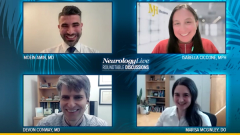
The Role of Aging in Multiple Sclerosis Care
Experts discussed how aging impacts multiple sclerosis management, treatment decisions, and overall patient health. [WATCH TIME: 5 minutes]
WATCH TIME: 5 minutes
The
In collaboration with
In this episode, experts highlighted aging as a key topic in MS care. They emphasized the growing need to understand the biological and clinical implications of aging, including comorbidities, treatment discontinuation, and general health maintenance. As patients with MS live longer because of effective therapies, the experts noted that clinicians are increasingly focusing on personalized approaches that account for aging-related changes and overall wellness.
Transcript edited for clarity.
Isabella Ciccone, MPH: So what I'm going to do is ask if anybody has any closing remarks on overall, their time at ACTRIMS, and if they're looking forward to any thing else for the next meeting?
Moein Amin, MD: I would just say one other big topic that was really exciting and we didn't get to talk about necessarily was aging in MS. And that's, again, another kind of relevant topic for all of us clinicians, because many of our patients are continuing to live longer. And with the ability of the disease-modifying treatments to keep the disease more stable over a more prolonged period of time, there's this opportunity to treat patients potentially longer term. We're still trying to understand all the implications of aging in MS—whether that's accelerating biological aging or the effect on immune cells, and what impact that will have on our treatments. That's something that McGinley has been involved in, obviously—whether that’s stopping disease-modifying therapies or potentially de-escalating. So that's an area that I look forward to hearing more about in future meetings as well.
Marisa McGinley, DO: Yeah, I completely agree. I think we absolutely have an aging population. We think of MS as a young person’s disease, diagnosed in their 20s and 40s. And we're fortunate now that our treatments are quite effective and our patients are living longer, doing better, but it also means that we're caring for patients, well into their sixth, seventh, eighth-plus decades. So understanding the biological changes—both that biological age versus chronological age, the impact of the comorbidities that occur as people age—and then, I mean, some of the work that we presented at ACTRIMS was thinking more about discontinuation.
And Conway gave another wonderful talk on the DISCOMS data and several of the other discontinuation trials, and it's a very hot topic because there's not a clear answer. And so really, as we try to, again, think about a more personalized approach—and that’s some of the work we presented on developing, using machine learning, a personalized risk model for discontinuation—so, efforts in that way. So I think a lot around treatment as our patients are aging, but I think underpinning that is understanding the biology and the other comorbid conditions that are happening. I agree, it's going to be a really important topic as we move forward.
Devon Conway, MD: And I guess just building on the aging issue, I think that it really kind of underscores the importance of general health in MS that I've been trying to emphasize more and more with my patients in clinic, as Dr. McGinley was referring to. As patients get older, they get more comorbidities, and there's mounting evidence of the impact of comorbidities on MS. And then, I think it ties together other features as well. There was an interesting abstract about biological age as measured by metabolomic profiles, and how there was a relationship between that and social determinants of health. And we know social determinants of health are also, you know, associated with factors of general health. And so I think it brings together this, you know, the whole picture for patients with MS and how the things that can come with aging also tend to make MS worse. And so that's something that we need to focus on, and we need to encourage our patients to be aware of—to manage their comorbidities, to get appropriate cancer screenings, and to be mindful of their general health. Because I really find that those patients who exercise, who don't smoke, and who take their disease-modifying therapies—they tend to do the best over the long term with their MS.
Newsletter
Keep your finger on the pulse of neurology—subscribe to NeurologyLive for expert interviews, new data, and breakthrough treatment updates.











